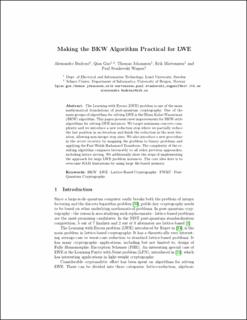Making the BKW Algorithm Practical for LWE
Journal article, Peer reviewed
Accepted version

View/
Date
2020Metadata
Show full item recordCollections
- Department of Informatics [928]
- Registrations from Cristin [9791]
Original version
Lecture Notes in Computer Science (LNCS). 2020, 12578, 417-439 https://doi.org/10.1007/978-3-030-65277-7_19Abstract
The Learning with Errors (LWE) problem is one of the main mathematical foundations of post-quantum cryptography. One of the main groups of algorithms for solving LWE is the Blum-Kalai-Wasserman (BKW) algorithm. This paper presents new improvements for BKW-style algorithms for solving LWE instances. We target minimum concrete complexity and we introduce a new reduction step where we partially reduce the last position in an iteration and finish the reduction in the next iteration, allowing non-integer step sizes. We also introduce a new procedure in the secret recovery by mapping the problem to binary problems and applying the Fast Walsh Hadamard Transform. The complexity of the resulting algorithm compares favourably to all other previous approaches, including lattice sieving. We additionally show the steps of implementing the approach for large LWE problem instances. The core idea here is to overcome RAM limitations by using large file-based memory.